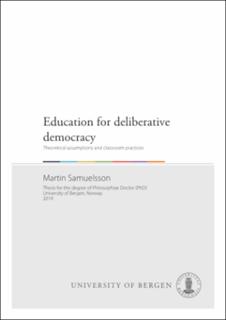| dc.description.abstract | It is often said that education is closely linked with democracy. This may refer to different things, however. It may refer to the idea that the educational system should be consistent with democratic values, for instance equal access. It may also refer to classroom practices that allow students to express their opinions and be at least partially in control of their school life. A third interpretation is as a preparation for future democratic participation. This involves teaching students common knowledge along with more specific democratic skills and values. This notion is often referred to as ‘education for democracy’, and this is the topic of the present dissertation. Here, education for deliberative democracy is investigated in a qualitative and explorative manner. The aim is to develop a comprehensive understanding of the specific knowledge, skills, and values that future citizens should acquire to be prepared to participate in deliberative democracy, and to identify the pedagogical practices that should be applied to achieve this. I investigated education for deliberative democracy in different phases, each phase corresponding with a different research focus. In the ‘pre-phase’, I addressed how scholars of political philosophy conceptualize deliberative democracy. According to the ideal of deliberative democracy, citizens and their representatives should justify their positions through public reasoning, in which they seek mutually justifiable reasons for the laws they impose on one another. It is not majority rule per se that justifies political decision but the reason-giving process that precedes voting, where citizens weigh arguments and alternatives against each other and strive toward mutual agreement. In ‘Phase 1 – Literature review’ I investigated how scholars of education describe and define the project ‘education for deliberative democracy’. What are the skills and values they advocate? Do these coincide with what scholars of political philosophy argue for? Furthermore, do they present ideas concerning how an education for deliberative democracy should be implemented? Two findings are particularly interesting. First, there is widespread agreement in the field about how future citizens should learn deliberative skills and values – through participation in democratic deliberations. Second, the field contains a gap. Articles arguing for deliberative democracy as an educational aim on the one hand, and articles investigating pedagogical practices on the other, are often far removed from one another. The problem lies mainly at the pedagogical end of the spectrum, where articles investigating pedagogical practices often fail to ground their studies in the political definition of deliberative democracy. This causes them to lose their immediate relevance to questions related to education for deliberative democracy. Thus, when the argument is made that deliberation as a pedagogical method fosters certain skills and values, the question that remains to be answered is what makes these relevant for deliberative democracy (article 1). In ‘Phase 2 – Empirical study’, I conducted a short-term ethnographic study. I found that many classroom discussions appear to be examples of democratic deliberations, but when scrutinized, they are found to lack one or more crucial features. In these cases, they often include either a reason-giving process and a reflective process or a search for a conclusion, but usually not all three simultaneously. However, at other times, they may include all three aspects and qualify as democratic deliberations. In this regard, the type of question discussed is important because different types of questions are associated with different types of discussions. Discussions including reason-giving and reflection, but lacking a search for a conclusion, are structured around open questions, whereas discussions including a search for conclusion but lacking reason-giving and reflection are structured around closed questions. Discussions including all three aspects, however, are structured around questions with a ’suitable’ balance between openness and closeness. Based on this, a practical implication is articulated: in order to steer classroom discussions in the direction of democratic deliberations, teachers should pose questions open enough to give students the possibility to disagree on the matter while at the same time closed enough to give them the opportunity to reach a collective conclusion (article 2). Furthermore, I found that consensus as a criterion for classroom discussions can be problematic, according to teachers experienced in conducting classroom discussions. It can alter the pattern of communication in undesirable ways and cause emotional strain in students. However, by defining consensus as a regulative aim and a multifaceted concept with different meanings, I argue that many different types of agreements and disagreements can coexist and that it should be possible to retain consensus as an ideal in classroom deliberations without necessarily creating the negative side effects declared by the teachers (article 3). In the ‘concluding phase’, I formulated my version of an education for deliberative democracy. Grounded in the political understanding of deliberative democracy, I argue that an education for deliberative democracy should focus on teaching future citizens how to give each other reasons for the positions they hold, how to weigh different arguments and alternatives against each reason offered, and how to strive for mutually acceptable decisions on how to act. Furthermore, I argue that they should learn this by practicing democratic deliberations (in the classroom). In this regard, the teacher’s task is to moderate the classroom discussion, to reflect on a number of contextual factors, and to steer the exchange of ideas in the direction of democratic deliberations. This will give students the opportunity to practice giving reasons, reflecting over others’ statements, and striving for collective conclusions. This formulation can be regarded as a minimalistic model of an education for deliberative democracy. There are arguably other skills and values that are also important for deliberative participation. However, in order for such skills and values to be relevant in a deliberative sense, they need to be firmly connected to the core activity of deliberative participation. I therefore argue that even though this formulation is a minimalistic one, it is the necessary starting point for an education for deliberative democracy. | en_US |
